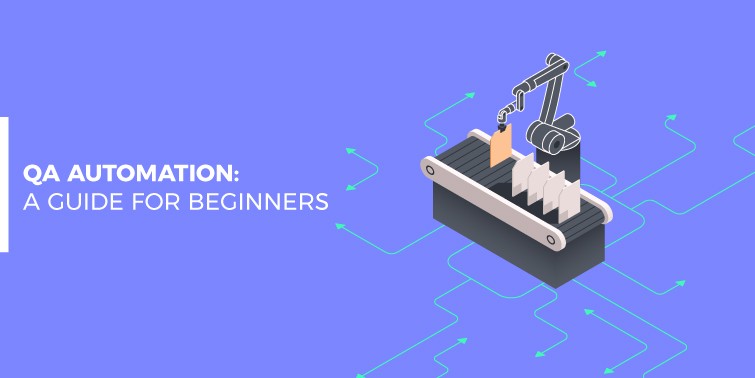QA Automation: A Guide for Beginners
Quality assurance is one of the main roles in the development process. It is crucial to have a comprehensive QA process to ensure the product operates as it intends to do.
In this blog article, we are going to dive into the different aspects of QA automation engineering and find out what it is and how to become one.
What is QA Automation?
QA Automation revolutionizes software testing by automating time-consuming tasks, enhancing efficiency, and enabling more frequent testing cycles. Integrated into the software development life cycle (SDLC), it supports continuous integration and delivery practices, facilitating rapid problem identification.
The Difference Between Manual and Automation Testing?
Before moving forward, let us make it clear the difference between manual and automated QA. Both manual and automation testing methodologies play vital roles in the software development life cycle (SDLC), each offering distinct benefits and considerations. The choice between these approaches depends on various factors, such as project requirements, time constraints, budget, system complexity, and the proficiency of the testing team.
Manual QA Engineers test the software manually. They create and follow written test plans and report errors to developers. Manual testing is best suited for newly implemented features, assessing user experience (UX) and the overall feel of an application, and tasks that necessitate human judgment.
Automation testing uses tools and frameworks to simulate user interactions and conduct tests at scale. Automation also offers significant time savings, especially during regression testing, a process that can be difficult for manual testers.
Unlike manual testing, which lacks recordability, automation test scripts are reusable, making automation testing invaluable for repetitive testing and development cycles.
The Main Tools and Techniques in QA Automation
QA automation tools are becoming more and more sophisticated and precise. Let us look through the most popular QA automation tools you will most probably use in your work.
We can say, that there are two main groups of tools:
Code Test Automation: This is the more common method, where frameworks require the use of code for QA test creation. With these tools, QA Engineers have complete control over each step of the test process, allowing for the creation of complex tests. Test frameworks typically support multiple programming languages, enabling the use of preferred languages for writing test scripts.
No-Code Test Automation: Some frameworks support the creation of QA tests without requiring coding experience. For instance, the TestProject test recorder allows users to build step-by-step tests using a user-friendly interface. However, the limitations of no-code test automation tools may restrict the complexity of tests tailored to specific applications.
Many automation tools are available in the market for web and mobile testing. Below are some of the most popular ones:
LambdaTest: A cloud-based cross-browser testing platform supporting various frameworks and tools integration for web and app test automation.
Puppeteer: A JavaScript library developed by Google, allowing control over headless Chrome through the DevTools Protocol, suitable for automating web application testing.
Playwright: Developed by Microsoft, it is a Node.js library for automating browsers such as Firefox, Chromium, and WebKit, offering efficient and reliable automated browser testing.
Selenium: The most popular and widely used open-source automation testing suite, compatible with multiple programming languages, enabling testers to automate website testing.
Cypress: A new automation testing tool built for front-end developers, offering simplicity, speed, and reliability for testing in modern browsers.
Appium: An open-source tool widely used for automating native, hybrid, and mobile web apps across different platforms without the need for app recompilation.
Cucumber: A testing tool supporting Behavior Driven Development (BDD), allowing for the creation of more understandable tests without technical knowledge, particularly useful for writing acceptance test cases from a business perspective. The combination of Selenium and Cucumber provides a reliable and robust framework for creating functional tests easily.
Various Positions of QA Automation Engineers
In a company, QA Engineers may hold various positions depending on their experience, expertise, and the specific needs of the organization. Here are some common positions:
QA Automation Engineer: Specializes in developing and maintaining automated test scripts and frameworks. Works closely with developers to integrate automated tests into the CI/CD pipeline and streamline the testing process.
QA Lead/Manager: Oversees the QA team and activities within a project or department. Responsibilities include resource allocation, test strategy development, stakeholder communication, and ensuring adherence to quality standards and timelines.
Quality Assurance Analyst: Focuses on analyzing requirements, defining test cases, and ensuring the alignment of testing efforts with business objectives. May also perform manual testing and assist in test automation activities.
Software Development Engineer in Test (SDET): Combines software development skills with testing expertise to build robust automation frameworks and tools. Responsible for designing and implementing test infrastructure, as well as contributing to the development of production code.
Quality Assurance Architect: Sets the technical direction for QA initiatives across the organization. Designs scalable testing solutions, evaluates new tools and technologies and establishes best practices to optimize the QA process.
Test Manager/Director: Leads the overall testing strategy and execution across multiple projects or departments. Responsibilities include resource management, budgeting, risk assessment, and aligning testing efforts with organizational goals.
While planning your career as a QA automation engineer, think about the trajectory of your advancement. You can develop your leadership skills along with the technical proficiency to step into managerial roles in QA, such as QA lead, or QA director. Alternatively, if you are more in technical skills, you can dive deeper into development and position yourself as an SDET or QA architect.
How to start a career as a QA Automation Engineer?
Starting a QA Automation Engineer career requires dedication, continuous learning, and practical experience. By following these steps and staying committed to your goals, you can build a successful career in automation testing.
1. Gain foundational knowledge
Learn software testing fundamentals, covering various methodologies, testing types, and the software development life cycle (SDLC). Usually, the QA automation engineer’s career starts with manual QA roles. This phase of the career is crucial to understanding the essence and processes of QA. Further, gain proficiency in a programming language used in automation testing, such as Java, Python, JavaScript, or C#. Familiarize yourself with popular automation testing tools like Selenium, Appium, or Cypress, understanding their features and capabilities.
2. Learn Automation Testing
Start practicing automation testing by working on small projects or exercises. Use online resources, tutorials, and courses to gain practical experience. Explore automation testing frameworks like TestNG, JUnit, or NUnit, and master their use for test automation. Dive into version control systems like Git for collaboration and managing projects effectively.
3. Build Projects and Portfolios
Once you are confident your automated tests work, start creating test automation projects to demonstrate your skills and understanding of automation testing. These projects can be personal, open-source contributions, or from online courses. Document your projects, including the problem statements, approaches, challenges, and solutions. A well-documented portfolio showcases your capabilities to potential employers.
4. Gain Experience
You can seek internships or entry-level positions in QA or automation testing, or consider freelancing or contract work for practical experience.
5. Continuous Learning and Improvement
Stay updated with the latest trends, tools, and technologies in automation testing and software development. Join online forums, communities, and social media groups related to QA and automation testing for networking with professionals. Consider obtaining certifications such as ISTQB Foundation Level Certification or automation tool-specific certifications to enhance credibility and marketability.
Top 5 Spheres to Work as a QA Automation Engineer
Software Companies: QA Automation Engineers are in demand in software development companies across various industries, including technology, finance, healthcare, and e-commerce. These companies offer opportunities to work on cutting-edge technologies and collaborate with skilled professionals in dynamic environments.
IT Consultancies: Consulting firms often hire QA Automation Engineers to work on projects for clients, providing exposure to different domains and technologies. This offers opportunities for diverse experiences and career growth.
Startups: Startups require QA Automation Engineers to ensure the quality of their products from the early stages of development. Working at a startup offers the chance to be part of innovative projects, contribute to product development, and experience rapid growth.
Testing Service Providers: Companies specializing in software testing services hire QA Automation Engineers to support their clients’ testing needs. This offers opportunities to work on a variety of projects and gain experience in different industries and technologies.
Financial Institutions: Banks, insurance companies, and financial service providers require QA Automation Engineers to test their software applications for accuracy, security, and compliance. Working in the financial sector offers stability, competitive compensation, and opportunities for professional development.
Additionally, remote work opportunities are plentiful, offering flexibility and access to global job markets.
Continuous Learning and Resources for QA Engineers
To stay updated with the latest trends and advancements in QA, there are various resources available. Exploring books on software testing and QA topics, such as “The Art of Software Testing” by Glenford J. Myers and “Agile Testing: A Practical Guide for Testers and Agile Teams” by Lisa Crispin and Janet Gregory, can provide in-depth knowledge and valuable insights into QA principles and practices.
However, if you are just about starting to explore QA automation, consider taking part in BDG’s QA Automation with Java course or QA Automation with Python course. This course is designed for manual QA engineers who intend to upgrade their skills and master automated testing.
Additionally, engaging in discussions on QA-related forums like Stack Overflow, Reddit’s r/QualityAssurance, and QAforums.net allows QA engineers to exchange knowledge, share experiences, and seek guidance from fellow professionals in the field.
Listening to QA and testing podcasts like “Test Talks” and “Quality Sense” provides access to interviews, discussions, and insights from industry experts, offering valuable perspectives and ideas for continuous learning and professional growth.
Is QA Automation Right for You?
QA automation offers numerous benefits, including increased efficiency, faster testing cycles, and improved software quality, but it may not be the ideal career path for everyone. To thrive in QA automation, you should possess a combination of technical aptitude, problem-solving skills, attention to detail, and a passion for continuous learning.
If you enjoy working with technology, have a knack for coding, and find fulfillment in identifying and solving complex problems, QA automation could be an excellent fit for you. However, it’s essential to recognize that automation testing requires patience, persistence, and the ability to adapt to evolving technologies and methodologies.
Before committing to a career in QA automation, take the time to explore the field, gain hands-on experience, and assess whether the challenges and opportunities align with your interests and career goals. Remember, a successful QA automation engineer is not only proficient in technical skills but also possesses strong communication, collaboration, and analytical abilities to effectively contribute to the software development process.





